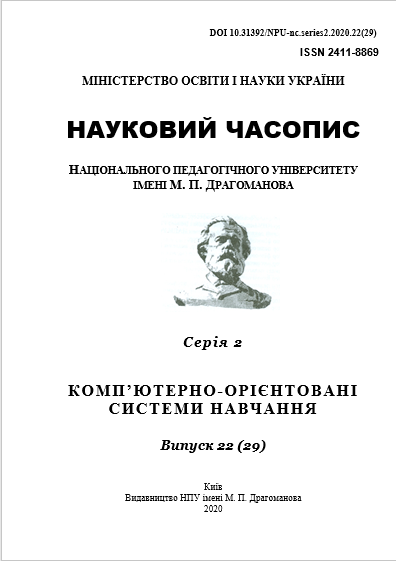FEATURES OF IT-PROJECT MANAGEMENT COURSE IN HIGHER EDUCATION INSTITUTIONS
DOI:
https://doi.org/10.31392/NPU-nc.series2.2020.22(29).10Keywords:
management,, project, IT project, information technology, software, training programAbstract
In today's conditions of development of the information economy, the priority area is the development in the field of information technologies. Software and software development are a complex project that requires specialized project managers to manage. As a result, there is a severe lack of formalization, preparation, and project management skills in the professional environment. Therefore, there is an urgent need to master the global experience of developing, analyzing, implementing, and managing projects, especially in the field of information systems and software development.
The article deals with the peculiarities of the discipline “IT Project Management” in higher education institutions of І-ІІ accreditation level. The main purpose of teaching the discipline "Project Management" is defined as the formation of students' ideas about the methodology of preparation and implementation, ways and means of project construction, attracting resources for the implementation of these projects and mechanisms for managing them. The objective of the course is to give students a system of theoretical knowledge and to develop practical skills in the field of planning, evaluation, monitoring and support of projects in the IT field.
The content of the course "IT Project Management", which is designed to prepare students in the specialty "Computer Science" of all forms of training, is disclosed. Students acquire a complex of knowledge and skills that will allow them to understand the process of project management, to practically use the means of planning and implementation of IT projects, to develop the right structure of the project implementation plan, to acquire practical skills of using information systems in which the development and implementation of project implementation stages, assigning responsible for stages of implementation, to write the terms of reference using the regulatory documents and relevant GOST.
Some methodological aspects of project management training are considered as a necessary link of professional training of specialists in the field of information technologies. A brief overview of the most common project management systems: MS Project, OpenPlan Professional and Project Expert. The course training should facilitate students' acquisition of basic knowledge of the principles of project management theory in software development and the acquisition of laboratory skills in planning, controlling, and optimizing software development processes.

